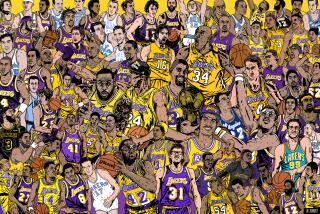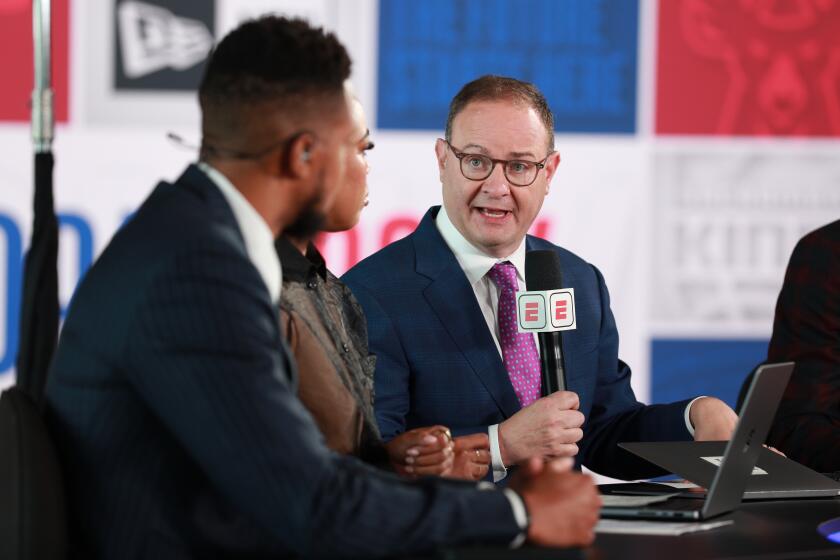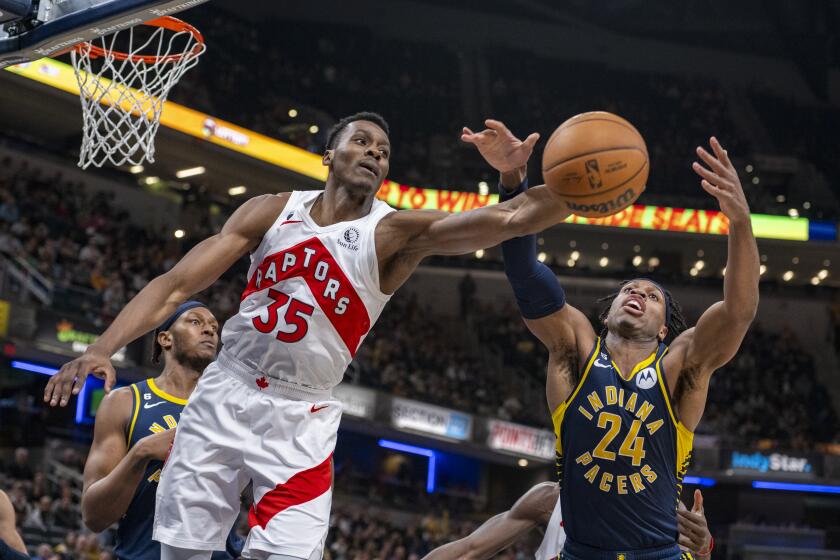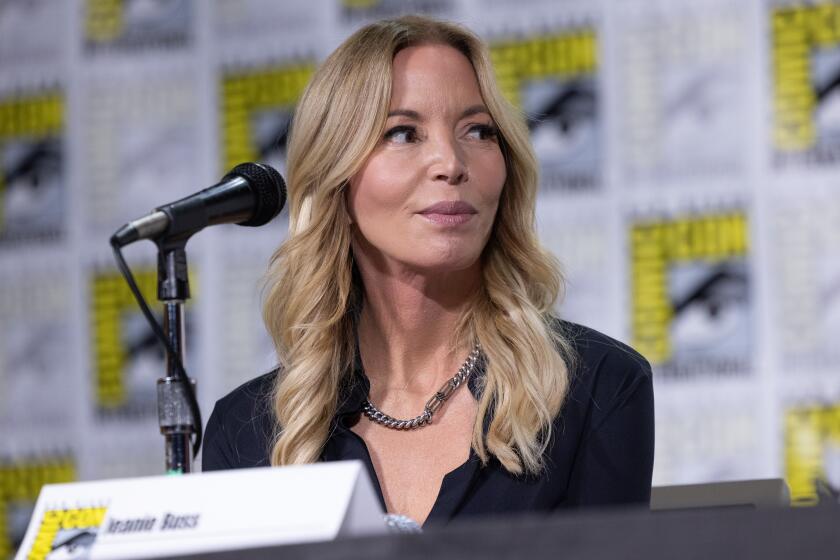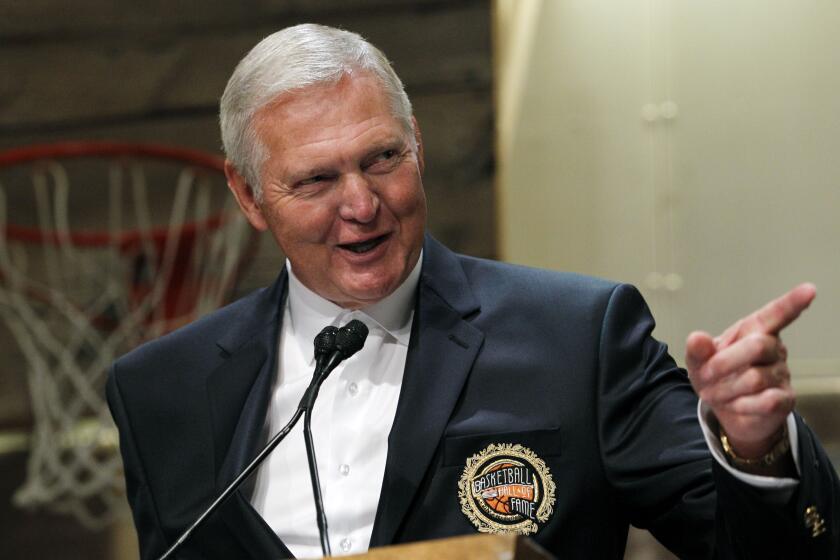Meschery found rhyme and reason beyond basketball
When art professor Melanie Marchant started dating former NBA player Tom Meschery a few years ago, male friends weren’t shy about sharing their thoughts on her new man.
“They’d pull me aside,” she notes, smiling and lowering her voice conspiratorially, “and they would say to me, ‘He was the meanest S.O.B. I ever say play.’ ”
You wouldn’t know it today.
It’s not that the 6-foot-6 Meschery, who played most of his 10 NBA seasons in the 1960s, is any less imposing.
It’s just that he is a thoughtful, compassionate man who looks less like what he may have been years ago and more like what he became after his playing days ended in 1971: owner of a bookstore-tea shop and later, for more than 20 years, a high school and junior college English teacher in Reno and Truckee, Calif.
A son of Russian refugees, Meschery, 71, has long been a study in contrasts. Known by turns during his NBA career as “The Mad Russian” and, on the flip side, “Renaissance Man,” he is a longtime poet. In retirement, he recently completed a first draft on a debut mystery novel and is about halfway through a sequel. He also has penned a memoir and started work on a third novel.
In 2002, the NBA’s first Russian player and the first player to have his number retired by the Golden State Warriors was inducted into the Nevada Writers Hall of Fame. But even the Writers Hall couldn’t help but notice the contradiction, noting in a story announcing Meschery’s enshrinement that he “doesn’t fit the traditional image of a poet. He’s neither physically slight, anemic, pale, [nor] sissified.”
What he is, Meschery says, is passionate -- and eclectic. “I realize I’ve lived an unusual life,” he says. “It definitely hasn’t been a vertical life. It’s been much more horizontal. My interests are varied, and I think that kept me from simply focusing on basketball. I can get so interested in so many different things.”
Seated in the living room of the condominium where he and Marchant were married Feb. 14, Meschery says his on-court ferocity and combativeness -- he once picked a fight with Wilt Chamberlain -- were products of his unusual background.
He was born Tomislav Nicholiavich Mescheriakov in Harbin, Manchuria, his parents having fled their homeland for China after the 1917 Bolshevik Revolution. His father, Nicholas, got a visa in 1938 to take a job as a longshoreman in San Francisco but had to leave the rest of the family -- Tom, his mother and a sister -- behind.
Tom and the others didn’t make it to San Francisco until 1946 -- after spending World War II in a prison camp in Tokyo.
The Mescheriakovs later changed their name to Meschery to avoid the stigma of being Russian during the escalating Cold War and Tom saw sports as a way to gain acceptance.
“I’m pretty sure the reason I played basketball had very little to do initially with some kind of love of the game,” he says. “I think initially it had a lot to do with becoming an American.
“I was an immigrant, so to me playing basketball was crucial. When I think of poor kids who play basketball to get out of their situations -- African American kids, in particular -- I understand that, because I think for me it was a way to get out of being an immigrant and being this foreigner to becoming an American.
“So, for me, it was a very intense experience. Playing basketball, I had to succeed because the more I succeeded, the greater the American I was.”
Meschery took his tenacity all the way to the NBA, where he averaged 12.7 points and 8.6 rebounds while playing for the Philadelphia and San Francisco Warriors and, after a short-lived retirement, four seasons with the Seattle SuperSonics.
“I always thought I was the underdog,” he says. “It made me a better player. I always felt like I was battling uphill.”
Against Chamberlain, he was.
“He laughed at me,” Meschery says of their confrontation. “Actually, if you’d made a movie out of it, it would have been hilarious because I was swinging at him and he was holding my forehead. So, it was a classic cartoon-like position.
“He kept saying, ‘Tommy, what are you doing?’ ”
After he stopped playing, Meschery says he was “lost” for a while. “I came down very hard from basketball.”
He tried coaching but says he didn’t have the knack for it. “I didn’t have a lot of patience,” he says. “I couldn’t stand to see players not work hard, and I wasn’t very subtle about telling them they were lazy, so they didn’t like me very much.”
A father of three, he studied poetry with Mark Strand, the U.S. poet laureate in 1990-91, and later turned to teaching.
“I loved teaching,” Meschery says. “It was sort of like playing professional basketball again. Every day, you had to be up. Every day was a new game.”
He retired in 2005 and started writing in earnest, spurred in part by bad news: He was diagnosed with multiple myeloma. In December 2006, he underwent a stem-cell transplant.”It’s in remission; that’s the good news,” he says. “The bad news is, it’s incurable. It’s going to come back and kill me.” Doctors tell him he might have as many as 10 years left.
He tells them he’ll keep fighting.
--
More to Read
All things Lakers, all the time.
Get all the Lakers news you need in Dan Woike's weekly newsletter.
You may occasionally receive promotional content from the Los Angeles Times.
